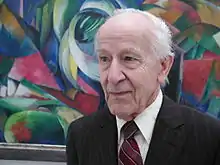Rolf Huisgen
Rolf Huisgen (13 June 1920 – 26 March 2020) was a German chemist.
Rolf Huisgen | |
|---|---|
 Rolf Huisgen (2004) in front of the painting "Mandrill" by Franz Marc | |
| Born | 13 June 1920 |
| Died | 26 March 2020 (aged 99) |
| Nationality | German |
| Alma mater | University of Munich |
| Known for | 1,3-Dipolar cycloaddition |
| Awards | 1961 Liebig Medal 1979 Otto Hahn Prize for Chemistry and Physics |
| Scientific career | |
| Fields | Chemist |
| Institutions | University of Munich |
| Doctoral advisor | Heinrich Otto Wieland |
In 1947, he was named professor at the University of Tübingen in 1949. He returned to the University of Munich in 1952 where he remained dedicated to research long after attaining emeritus status in 1988.[1]
His best known work was related to the 1,3-Dipolar cycloaddition reaction, also known as the Huisgen cycloaddition or Huisgen reaction.[2] He is an important person in post-war chemistry departments in Germany and Austria, due to the large number of his "habilitants" becoming professors.
His daughter, mathematician Birge Huisgen-Zimmermann was born in 1946.
Huisgen died on 26 March 2020 at the age of 99.[3]
References
- Jeffrey I. Seeman (2005). "Rolf Huisgen: A Gentleman Scholar with Energy and Passion". Helvetica Chimica Acta. 88 (6): 1145–1153. doi:10.1002/hlca.200590097.
- Huisgen, Rolf (November 1963). "Kinetics and Mechanism of 1,3-Dipolar Cycloadditions". Angewandte Chemie International Edition. 2 (11): 633–645. doi:10.1002/anie.196306331. Archived from the original on 2012-12-11.
- Rolf Huisgen (1920 – 2020)
This article is issued from Wikipedia. The text is licensed under Creative Commons - Attribution - Sharealike. Additional terms may apply for the media files.